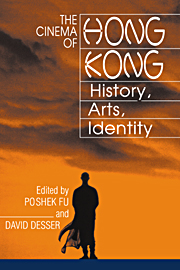Book contents
- Frontmatter
- Contents
- List of Contributors
- Acknowledgments
- Introduction
- Chronology of Hong Kong Cinema
- PART I HISTORY
- PART II ARTS
- 5 Richness through Imperfection: King Hu and the Glimpse
- 6 Space, Place, and Spectacle: The Crisis Cinema of John Woo
- 7 Besides Fists and Blood: Michael Hui and Cantonese Comedy
- 8 The Film Work of Ann Hui
- PART III IDENTITY
- Index
8 - The Film Work of Ann Hui
Published online by Cambridge University Press: 05 June 2012
- Frontmatter
- Contents
- List of Contributors
- Acknowledgments
- Introduction
- Chronology of Hong Kong Cinema
- PART I HISTORY
- PART II ARTS
- 5 Richness through Imperfection: King Hu and the Glimpse
- 6 Space, Place, and Spectacle: The Crisis Cinema of John Woo
- 7 Besides Fists and Blood: Michael Hui and Cantonese Comedy
- 8 The Film Work of Ann Hui
- PART III IDENTITY
- Index
Summary
“The past is another country.”
As the director of fifteen feature films spanning a period of two decades, Ann Hui has established herself as one of Hong Kong's foremost directors. In the late 1970s, she was a founding member of the Hong Kong New Wave cinema. More impressive is the fact that as a woman, hers is one of the largest bodies of work, not solely in Asia, but worldwide.
Although she does not identify herself as a “woman director,” she no longer disparages the term, either. Unlike so many other female directors, Hui has not concentrated on the “woman's picture.” Rather, she has undertaken a wide range of subject matter and worked in various cinematic modes, including narrative fiction and documentary. More recently, she has also taken up the role of producer.
Hui On-wah, Ann (a.k.a. Xu Anhua) was born in Northeastern China (Manchuria) in 1947. She moved to Hong Kong with her family in 1952. There she received a Catholic education and earned her baccalaureate from the prestigious Hong Kong University, majoring in English and comparative literature. She continued on for a master's degree with a focus on Robbe- Grillet.
This was followed by two years at the London Film School. When she returned to Hong Kong in 1975, she did a brief stint as an assistant to the Hong Kong director King Hu and then began work for TVB.
- Type
- Chapter
- Information
- The Cinema of Hong KongHistory, Arts, Identity, pp. 176 - 196Publisher: Cambridge University PressPrint publication year: 2000
- 5
- Cited by

